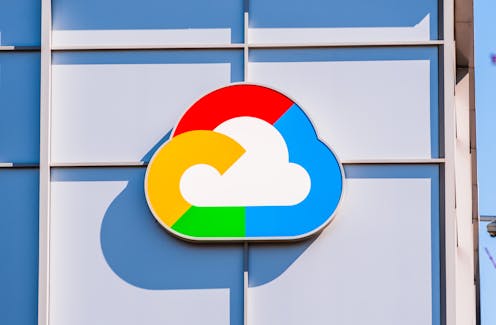
Amid an ongoing cost-cutting effort, Twitter has now refused to pay the bills to renew its multi-year contract with Google Cloud, Platformer has reported.
We’ve all heard of “the cloud” – but what does it have to do with Twitter? And more to the point, what will the consequences be for Twitter users if Google Cloud pulls the plug on the platform?
What are cloud computing services?
To put it simply, “the cloud” is an assembly of computing resources that are remotely accessible over the internet. These resources are leased out to internet-connected organisations so they don’t have to buy and maintain their own.
In Twitter’s case, these resources include storage space for very large quantities of data, as well as a suite of programs that perform various operations on these data, as agreed upon in the contract. All of this takes place across a global network of physical servers.
Read more: Where's your data? It's not actually in the cloud, it's sitting in a data centre
Cloud computing is a convenient and cost-effective business model, which has gained much favour from enterprises large and small.
Currently, a handful of players dominate this market. In the lead is Amazon Web Services (AWS) which holds about 32% of the market. Amazon became the first cloud provider in 2006 and has since established a comfortable lead over its rivals, Microsoft Azure (23%) and Google Cloud (10%).
Reliability and scalability are perhaps the most important requirements a company will have of its cloud service provider. And when it comes to reliability, “redundancy” is key.
Redundancy means that if one data centre goes down, there are multiple others with duplicate data that can seamlessly step into service. And if the quantity of user data is high in one particular data centre, the extra load can be farmed out to another. In this way, peak traffic periods can be managed without loss of performance.
What might happen if Google pulls the plug?
It seems Twitter is at loggerheads with its cloud provider, Google Cloud. The company is reportedly disputing its Google Cloud bill as it seeks to renegotiate its contract with Google.
The issue appears to be rooted in a disagreement over service quality and performance. Twitter doesn’t think it’s getting value for money, and is withholding the latest payment in its US$1 billion contract with Google Cloud.
Under the contract, Google Cloud hosts many of Twitter’s trust and safety services. If the disagreement isn’t resolved by the end of the month, and if Twitter severs ties with Google Cloud, this could seriously threaten its ability to fight spam, remove child sexual abuse material and generally protect accounts.
Google also currently allows Twitter users to sign up with their Google account. And Twitter profiles are highly ranked in Google searches, by virtue of Twitter’s close ties with Google. This favoured status could be in jeopardy if the two companies can’t come to terms.
Apart from Google Cloud, Twitter also has a multi-year cloud computing contract with AWS to offer a host of functions. According to reports, it has also withheld payments from Amazon in the past and owed some US$70 million in bills as of March. Amazon responded by threatening to withhold payments for advertising it runs on the platform.
Why is Twitter refusing to pay?
The dispute can perhaps be understood as yet another attempt by Twitter to radically reduce operating costs. It’s a a trend that began late last year when Elon Musk acquired the company for US$44 billion.
Musk, who just appointed former NBC Universal advertising executive Linda Yaccarino as Twitter CEO, has implemented a suite of cost-cutting measures since the takeover – among these, the firing of more than half of the company’s 7,500 employees.
Looking at the big picture, we see Musk in the throes of trying to make Twitter a leaner, more efficient business.
Cracking down on malicious misuse
At stake in this dispute are services that help keep Twitter free of malicious, dangerous and offensive content. Twitter’s battle against this content, as well as against spam and bots, has been ongoing. While it’s difficult to predict the outcome of the dispute with Google, it’s likely Twitter will take whatever course of action helps the company save money.
That could mean moving those services to a different provider, or retaining Google Cloud’s services but on more favourable terms. Another possibility (although less likely) is for Twitter to migrate those particular services in-house where it will have more control. But this would also require spending and human resources to manage the data.
In a worst-case scenario, Twitter may collapse or destabilise if certain elements within it go offline. Aside from Twitter trolls, this outcome would be in nobody’s best interest. So it’s more likely Twitter and Google Cloud will find a mutually agreeable way forward.
Read more: Instead of showing leadership, Twitter pays lip service to the dangers of deep fakes
David Tuffley does not work for, consult, own shares in or receive funding from any company or organisation that would benefit from this article, and has disclosed no relevant affiliations beyond their academic appointment.
This article was originally published on The Conversation. Read the original article.







